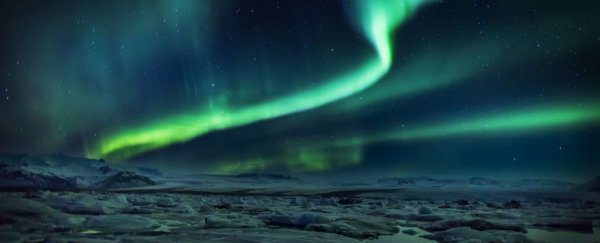
The Ghostly Sounds of Auroras Can Be Heard, Even When They're Invisible
MICHELLE STARR
17 MAY 2022
If you're up high, and you listen carefully on nights when the northern sky dances with blazing sheets of green light – Earth's spectacular aurora borealis – you might hear some ghostly sounds.
Almost imperceptible, the sounds had only been heard during the wildest aurora displays, described as rushing sounds, like a waterfall at a distance, or popping and crackling like faint static.
New evidence, however, suggests that the sounds take place high up in the atmosphere even when we can't hear them – even, perhaps, when we can't see the northern lights at all.
Acoustic engineer Unto Laine from Aalto University in Finland has managed to record these strange popping sounds in the sky, on a night when no curtains of light put in an appearance.
He presented his findings at the EUROREGIO/BNAM2022 Joint Acoustics Conference in Denmark this month.
"This cancels the argument that auroral sounds are extremely rare and that the aurora borealis should be exceptionally bright and lively," Laine says.
Auroral sounds have been something of a mystery for a long time. Reports had been described for over a century, at least, but it wasn't until 2012 that recordings, made by Laine and his colleagues, finally confirmed that the sounds were real.
The researchers also identified where the sounds were coming from in the atmosphere – at an altitude of about 70 to 100 meters (230 to 330 feet), which is surprisingly low.
https://youtu.be/NRZfKqhs6rM
Auroras are caused when particles from the solar wind collide with Earth's magnetosphere, and are then accelerated along the lines of the magnetic field to high latitudes, where they rain down into the upper atmosphere.
There, they interact with atmospheric particles to produce the shimmering lights that dance across the sky.
In 2016, Laine and his colleagues revealed that they had figured out what causes the sounds some people have reported hearing.
On particularly cold, clear, calm nights, a layer of warmer air forms above a shallow layer of cold air at the bottom of the atmosphere.
Opposite electrical charges can build up in these two layers; when geomagnetic disturbances, perhaps triggered by the aurora, propagate down through the atmosphere, it can cause an electrical discharge between the layers, which causes the noise.
The new recordings were made in an attempt to investigate the phenomenon further. Near the village of Fiskars, the team set up their recording equipment to listen for popping, crackling sounds emanating from the atmosphere.
The observations were then cross-referenced against measurements of geomagnetic activity made by the Finnish Meteorological Institute. In all, the team collected a library of hundreds of candidate sounds, of which the 60 strongest were linked with changes in Earth's magnetic field.
"Using the geomagnetic data, which was measured independently, it's possible to predict when auroral sounds will happen in my recordings with 90 percent accuracy," Laine says.
The work suggests that there is likely a causal link between the auroral sounds and geomagnetic activity, with different types of activity producing different sounds.
The processes that produce these sounds are also different from the processes that produce auroral displays; however, since both are produced by geomagnetic activity, they can appear together.
The new work shows that they don't have to coincide. Many an aurora has been observed in the absence of auroral sounds; now auroral sound has been observed in the absence of auroral light.
"That was the largest surprise!" Laine says.
"The sounds are much more common than anyone thought, but when people hear them without visible aurora, they think it's just ice cracking or maybe a dog or some other animal."
We may, however, continue to use the term "auroral sound", because of the historical perceived link between the two, Laine says.
The research was presented at the UROREGIO/BNAM2022 Joint Acoustics Conference, and is available via Researchgate.
https://www.sciencealert.com/we-can-hear-the-sound-of-aurora-even-when-it-can-t-be-seen
Thanks to: https://www.sciencealert.com






 Sat Mar 23, 2024 11:33 pm by globalturbo
Sat Mar 23, 2024 11:33 pm by globalturbo

